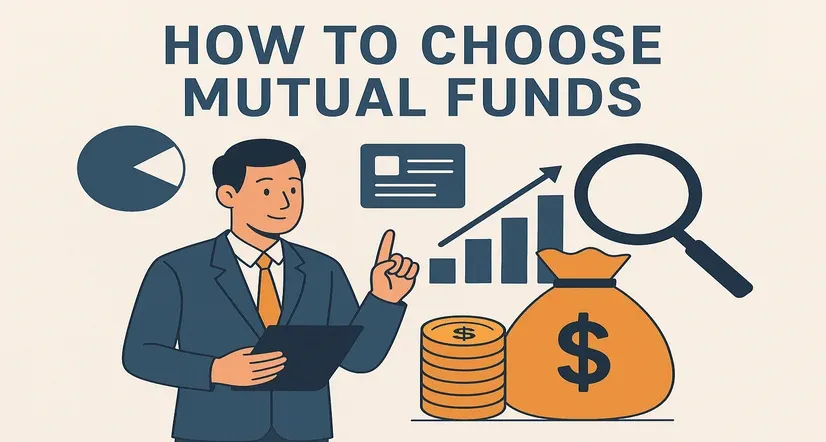How to Choose the Right Mutual Fund for Your Goals


Arjun has been staring at the mutual fund app for nearly an hour.
At 26, he’s a whiz at debugging complex code; yet completely stumped by a different kind of problem: choosing between a “Large Cap Fund,” “Flexi Cap Fund,” or “Multi Cap Fund.”
His browser has seventeen tabs open: fund comparison sites, YouTube explainers, Reddit threads, finance blogs. Weeks into his research spiral, he still hasn’t invested a single rupee. His savings are quietly growing… at 3% interest in his bank account.
“It’s ironic,” he sighs. “I can solve logic errors in seconds, but not this.”
One afternoon, his colleague Suresh walks past and spots the familiar look of frustration.
“Still researching mutual funds?” he teases.
Arjun nods. “Almost a month now. I get what the categories mean, but I can’t figure out which one’s actually best.”
Suresh chuckles. “Alright, humour me. If I told you I needed a new device for work and asked whether to buy a laptop or a tablet, what would you say?”
“Depends,” Arjun replies instinctively. “If you’re coding or designing, go for the laptop. If it’s just emails or reading, maybe a tablet.”
“Exactly,” Suresh says. “You wouldn’t declare one better than the other without knowing why you need it. Mutual fund categories work the same way. There’s no ‘best’ one, only the one that fits your purpose.”
That clicked instantly. Arjun realised he’d been treating fund categories like rival products, when in truth, they’re different tools for different goals.
“Before we get into the types,” Suresh begins, “you need to understand one basic distinction - active vs passive.”
Active funds are managed by professionals who pick stocks, aim to beat the market, and charge higher fees.
Passive funds (like index funds or ETFs) simply mirror an index like the Nifty 50 or Sensex. No stock picking, no fancy timing – just steady, predictable exposure. Lower fees, market-matching returns.
“Both have their place,” Suresh adds. “Every category we’ll talk about comes in both flavours. The trick is knowing which fits your style; do you prefer to back expert judgement or just track the market?”
“Equity funds are the growth engine,” Suresh explains. “They invest in actual companies, and that means higher potential returns, but also higher volatility.”
He breaks it down for Arjun:
“So multi-caps spread risk evenly, while flexi-caps adapt to the market?” Arjun asks.
“Exactly,” Suresh nods. “Structure versus flexibility.”
“So it’s not about finding the ‘best’ fund,” Arjun realises. “It’s about choosing the one that fits my time frame and risk comfort.”
“Exactly,” says Suresh. “Equity is your wealth builder, but only if you give it time.”
“Debt funds,” Suresh continues, “are your financial shock absorbers. They lend money to governments or companies: lower returns, but more stability.”
Dynamic Bond Funds: Adjust duration based on interest rate cycles.
Floater Funds: Adjust interest payouts with the market.
“So, safer than equity?” Arjun asks.
“Different risk, not safer,” Suresh replies. “Equity swings daily. Debt moves quietly, but the risk is hidden in interest rates and credit quality.”
“These are like balanced meals,” Suresh smiles. “A mix of equity for growth and debt for stability.”
“Think of hybrids as ‘set it and forget it’ funds,” Suresh explains. “You don’t need to juggle equity and debt yourself - the fund does it for you.”
“Then you have funds designed for specific life goals,” Suresh adds.
“So really,” Arjun says slowly, “it’s less about picking a category, more about matching it to my goal.”
“Exactly,” smiles Suresh. “You don’t need all thirty-six categories. You need three or four that suit your life.”
“So for my 5-year apartment goal?” Arjun asks.
“Hybrid Aggressive,” Suresh replies. “Equity for growth, debt for stability. You won’t lose sleep if markets drop in year four.”
As Arjun walks back to his desk, the fog has lifted.
Suresh didn’t give him new data; he gave him context.
Mutual fund categories aren’t rivals in a ranking table. They’re tools for different jobs. Once you know your goal, the right one becomes obvious.
“I’ve spent weeks analysing funds,” Arjun thinks. “Turns out, I just needed the right question.”
Disclaimer: This article is for educational purposes only. Past performance does not guarantee future returns. Please consult a qualified financial adviser before making investment decisions.